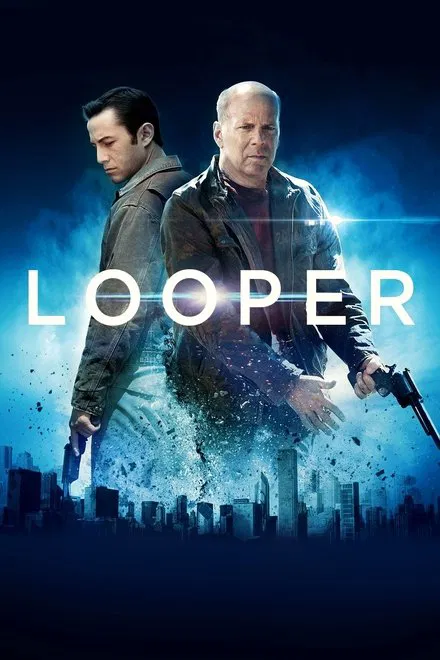
Directed by: Rian Johnson
Starring: Joseph Gordon-Levitt, Bruce Willis, Emily Blunt, Paul Dano, Jeff Daniels
🔫 Introduction: Assassins in the Loop
Looper (2012) is a slick, philosophical sci-fi thriller that uses the mechanics of time travel to interrogate questions of fate, free will, and sacrifice. Set in a future where criminal syndicates send their enemies back in time to be executed by “loopers,” Rian Johnson’s film is as much about moral ambiguity and self-determination as it is about bullets and paradoxes. The central drama unfolds between two versions of Joe (Joseph Gordon-Levitt and Bruce Willis), locked in a battle not just with each other, but with the very concept of destiny itself.
⏳ The Structure: Closed Loops and Unpredictable Futures
The looper system is predicated on temporal closure: a looper’s contract ends when he is forced to kill his own future self—thus “closing the loop.” When young Joe hesitates and his older self escapes, a violent chase ensues, upending the deterministic system and introducing chaos into the timeline. The film’s brilliance lies in its willingness to engage with paradox without getting lost in technicalities; instead, it focuses on the human consequences of decisions made across time.
Each iteration of Joe faces different challenges, temptations, and regrets. The past is always closing in on the future, and the present is perpetually on the verge of erasure. In this way, Looper dramatizes the eternal tension between what has been and what might be.
💡 The Moral Dilemma: Change, Sacrifice, and Empathy
The film’s emotional and ethical core is the question of sacrifice. Old Joe is determined to alter the timeline by killing the child who will become the Rainmaker—a ruthless crime lord responsible for his future suffering. Young Joe, however, comes to realize that violence only perpetuates the cycle. The climactic choice—to end his own life and thereby break the chain of cause and effect—is both a paradox and an act of profound empathy.
Johnson’s screenplay is unflinching in its refusal to offer easy redemption. The Rainmaker’s origin is neither wholly innocent nor entirely inevitable; the film suggests that trauma and loss are passed down through generations, and that the only hope for change is the willingness to break the loop—no matter the cost.
🔄 Paradox, Identity, and Responsibility
Looper plays with the idea of personal continuity: how much of our identity is shaped by memory, regret, and desire? The confrontation between the two Joes is not just a fight for survival, but a struggle for moral clarity. Both are deeply flawed, haunted by past failures and uncertain of the future. Their decisions reverberate outward, altering the lives of those around them in unpredictable ways.
The film’s twisty structure and stark violence serve a larger purpose: to ask whether change is possible within a closed system, or whether freedom is an illusion sustained by the willingness to sacrifice oneself for others.
🎯 Final Thoughts: The Loop Broken
Looper is a time travel film that refuses to let its cleverness overshadow its humanity. Its ending is both devastating and hopeful—a reminder that the future is always being rewritten, and that the greatest act of heroism may be the courage to end one’s own cycle of harm. In Johnson’s hands, the paradox of time becomes a mirror for the paradoxes of the heart.